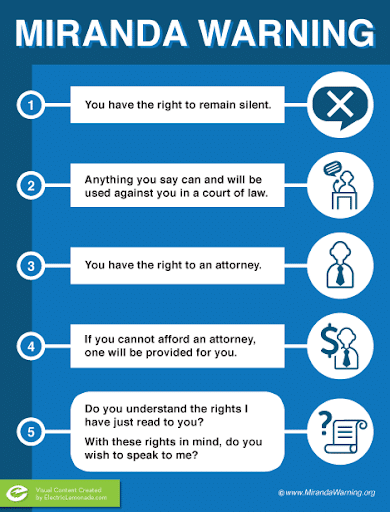Know Your Rights: “What About My Miranda Rights?”
 The police did not read my rights at the scene! Can they dismiss the case?!
The police did not read my rights at the scene! Can they dismiss the case?!
The answer is a confusing “yes and no”. The Miranda warnings are somewhat popular due to inclusion in many television police dramas. What many may not know is that there is no specific language for the warnings. However, the warnings must, using whatever language convey 4 basic warnings:
- The right to remain silent;
- That anything the person says may be used against them; (Note that it “may”, not “will” be. The rules of evidence prevent some statements from admission.)
- The right to an attorney before and during any questioning; (more on this later) and
- The right to have an attorney appointed if the person cannot afford one. (However, proving indigence can be very difficult to satisfy this right).
Miranda Warnings can be confusing
Another myth popularized by some police dramas is that the law requires the warnings for simple information gathering. This is simply not true. The law only requires reading the warnings during “custody” or “interrogation” of a person (typically called “custodial interrogation”). In some situations, this may mean after the police place you under arrest. However, an “arrest” is not a “custodial interrogation” unless the officer starts to ask specific questions. If the officer is only talking while transporting you to the jail, you are not “interrogated”. Only if the officer is asking questions specifically designed to gather information about the crime is it an “interrogation” to trigger the rights.
As another confusing point, you must EXPRESSLY invoke these rights. That means if you want to invoke the right to remain silent, you must specifically say “I am going to remain silent” to the officer. In some cases, simply remaining silent can be enough. But, courts state that simply remaining silent is “ambiguous” and sometimes allow admission of statements made before invoking or waiving the right.
Miranda Warnings and Probation
There are many other specific examples of what we will call “loopholes” for the rights. Exploring every single aspect of the Miranda rights would take far too long for a casual reader (and in fact the Constitutional Rights associated with these warnings are the main subject of a semester-long Criminal Procedure course for law students)! One exception to know is that the warnings DO NOT APPLY to probation revocation proceedings because the evidence is not used to give extra punishment. Even if the rights did apply, in many cases the conditions of probation will specifically state that you may not refuse ANY lawful request by police. This means that if the officer (lawfully) asks for a blood draw, you must do it.
Consent to Search
Though not included in the rights discussed above, you have the right to refuse a request for the police to search you or your car (mostly). If police stop you for speeding and ask to search your car, for example, you can refuse the request. Once you refuse the request, the police will (usually) need to get a warrant for the search. Police may, however, search your car without a warrant under “exigent circumstances,” such as a search incident to arrest.
If police arrest you on suspicion of DWI, for example, they may search you and parts of your car without a warrant (usually on the premise of “officer safety”). In this case, police may search the driver’s side and, probably, the passenger compartment because it was in the area of your “control”. Police would usually not be able to search the trunk of your car because it is not related to the offense of DWI. If the police arrest you for a drug crime, however, the search may be larger to determine the amount in the car (to determine simple possession or intent to deliver).
What is not a stop and/or search?
When the officer approaches you and asks you questions, it is not a “stop” since you are free to leave or refuse to answer the questions. If the officer tells you that you may not leave, that is when the encounter becomes a stop. There are similar rules about searches. After a stop, an officer asking you to show license and registration is not a “search”. When an officer makes a lawful request for license and registration, you MUST comply with that request.
You must show your driver’s license (including CHL), registration, and proof of insurance. After that, however, you are generally free to refuse to perform any SFSTs or give breath/blood. In essence, you always have the right to refuse a test. If you refuse to give breath or blood, police must get a warrant to take your blood. Even though alcohol dissipates from the body quickly, that is not enough of an “exigent circumstance” for a warrant-less search.
How long can the police stop me?
If the police stop you for a traffic violation, the officer’s actions must be reasonably related to the circumstances justifying the initial stop. The stop may last no longer than necessary to address the traffic violation. The stop ends when tasks related to addressing the violation end (including checking license, registration, insurance, and outstanding warrants). Here is the BIG exception: If the police get reasonable suspicion of other activity, they can extend the stop to confirm or dispel the suspicion. Reasonable suspicion is hard to define, but is basically if the officer “reasonably” believes you are, were, or will be committing a crime.
For example, police may not request a drug dog to search a car to investigate a simple traffic violation. However, they may request one if, for example, they observe behavior that gives the officer reasonable suspicion of drug-related crime. In any case, the extra time has to be related to the reason for the stop. There is no specific amount of time that is “reasonable”. One innocent example is if the license or warrant check-up system is slow. Since those checks are related to the stop, a slow check that takes 15 minutes is still “reasonable”.
Right to an Attorney
Always, ALWAYS request an attorney be present before answering any questions. Make the request multiple times. Multiple specific requests for a lawyer can be suppressed at trial since repeated requests for an attorney can lead a jury to unfairly infer guilt. The evidentiary language is “the probative value is substantially outweighed by the risk of unfair prejudice”.
More about Mimi Coffey
When people look for a Top DWI Attorney or Best DWI Attorney, they look for experience, certification, and respect in the legal community. Mimi Coffey is a nationally-renowned trial attorney, board-certified in DWI by the NCDD. She has been practicing for over 24 years and is an author of multiple DWI Defense textbooks. She is also a national and state-wide lecturer on the law.
The Coffey Firm handles a wide variety of cases, including Unlawful Carrying Weapon (UCW), Assault (including family violence), Theft, and Possession charges.
Mimi is also listed on several “top” directory listings such as DWI Lawyers for Wise County, DWI Lawyer Tarrant County, DWI attorney Dallas County, DWI attorneys Collin County and DWI attorneys Parker County. Mimi is a caring DWI Lawyer in DFW, She is also involved in the Texas Tech School of Law foundation and enjoys using the skills she has developed to give back to the community.

